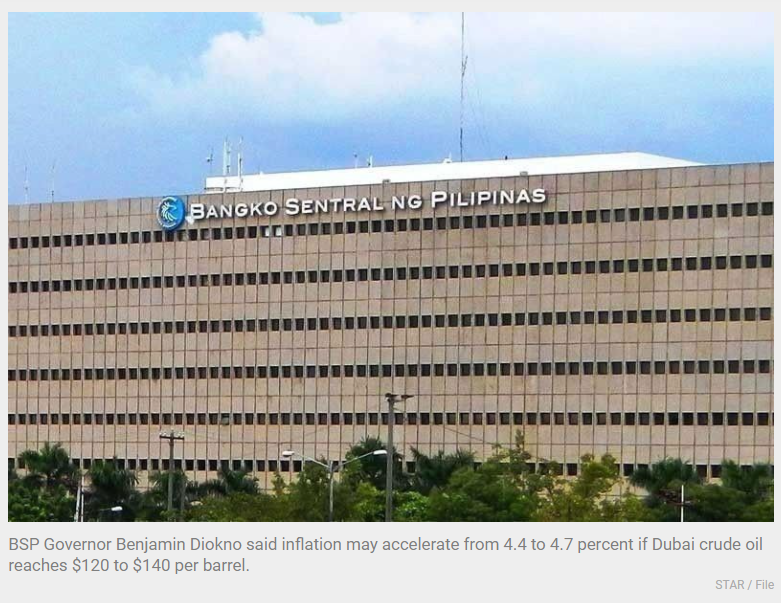Philippines: BSP sees inflation breaching target
MANILA, Philippines — The Bangko Sentral ng Pilipinas (BSP) sees inflation accelerating and breaching the two to four percent target under a worst-case scenario wherein global oil prices would return to 2018 elevated levels due to the ongoing Ukraine-Russia conflict.
BSP Governor Benjamin Diokno said inflation may accelerate from 4.4 to 4.7 percent if Dubai crude oil reaches $120 to $140 per barrel.
“Should the worst-case scenario of oil prices reaching $120 to $140 per barrel occur this year, inflation would be 0.7 to one percentage point above baseline in 2022. In brief, inflation would average between 4.4 and 4.7 percent under the worst-case scenario,” Diokno said.
The price of Dubai crude oil hit a record $141.33 per barrel on July 5, 2008. In 2008, the consumer price index (CPI) shot up to 9.3 percent and breached the BSP’s three to five percent target from 2.8 percent in 2007 on the back of the surge in oil and food prices.
The BSP has set an inflation target of two to four percent for 2022 and 2023 based on average crude oil prices of $95 per barrel.
Global oil prices have exceeded $90 per barrel and previous episodes of oil price surges suggest that oil prices could increase further.
The Monetary Board raised its inflation forecasts to 3.7 percent from the original target of 3.4 percent for this year and to 3.3 percent instead of 3.2 percent for 2023.
Inflation averaged three percent from January to February even as the full impact of rising global oil prices caused by the Ukraine-Russia war has yet to be felt.
“The biggest impact of the conflict is likely to come from spiking oil prices on concerns over possible disruptions in global oil supply,” Diokno said.
Capital Economics estimates a worst-case scenario where oil prices would increase to $120 to $140 per barrel amid sharply disrupted energy trade flows.
On the other hand, Oxford Economics sees the full invasion scenario cutting the country’s gross domestic product (GDP) growth by 0.1 percentage points in 2022 and 2023 and the global economy by 0.2 percentage points this year and 0.1 percentage points next year.
“For the Philippines, the impact will be indirectly through the war’s impact on the global economy and on prices of commodities, such as oil and energy and food,” Diokno said.
The BSP chief said the central bank is seeing muted impact of the Ukraine-Russia war on the domestic currency.
“In the peso-dollar exchange rate, the peso continued to trade sideways, with slight depreciation pressure. The BSP views such development as a result of the impact of the geopolitical tensions on oil prices, which likewise affected the peso,” Diokno said.
According to the BSP, the Philippines’ foreign exchange buffer is more than enough to address the external shock.
“It should be noted, however, that the Philippines has more than adequate level of foreign exchange reserves to temper any volatility in the exchange rate market,” Diokno said.
Diokno said the country’s external payment position is supported by structural inflows via remittances from overseas Filipino workers (OFWs), receipts from business process outsourcing, and foreign direct investments that have shown resilience even amidst the pandemic.
In addition, the BSP chief said monetary authorities have various liquidity-enhancing tools that could be deployed in case the domestic liquidity situation becomes unexpectedly tight or disorderly.
Source: https://www.philstar.com/business/2022/03/08/2165630/bsp-sees-inflation-breaching-target


 Thailand
Thailand




